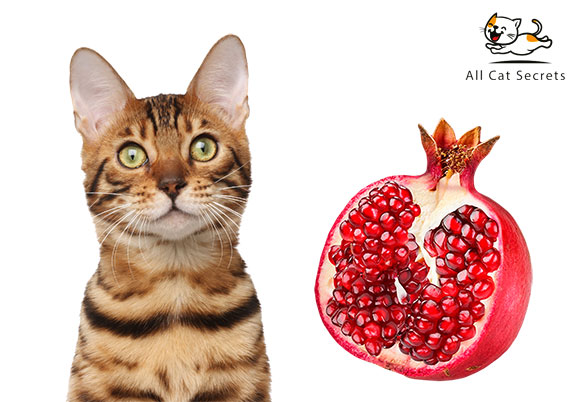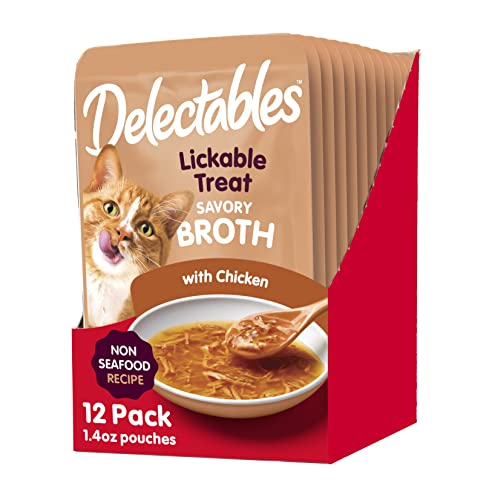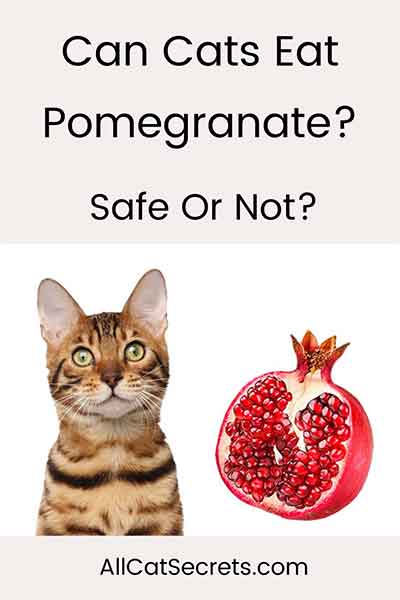Fruits are an inseparable part of the human diet. Most fruits are incredibly high in fiber, water, healthy carbohydrates, and a host of other nutrients. But can the same be said about our feline friends? Can cats safely eat fruits?
Unlike humans, cats have no sweet taste receptors. Therefore, your cat will unlikely develop a taste for fruity flavors. Besides, cats are obligate carnivores. Their diets comprise mainly of lean meat.
Although fruits are packed with nutrients, they may not necessarily be nutritionally beneficial to your four-legged feline companion. Plus, some fruits have been shown to pose immediate toxicity to cats.
Going by these revelations, you may now be wondering if your cat can eat pomegranates. But are pomegranates safe for cats?
Pomegranates are high in vitamins K, B-complex, and C, all of which may benefit your cat in some way. These fruits are also loaded with powerful antioxidants that could boost your kitto’s immunity. Therefore, pomegranates are safe and potentially healthy for cats.
But when it comes to fruits and cats, moderation is key. Pomegranates are only safe for cats if fed in measured portions. An excess consumption of this fruit could trigger sever adverse effects. Besides not all parts of the pomegranate fruit are safe for cats.
Read on for a comprehensive guide into cats and pomegranates.
Table of Contents
What Are Pomegranates?
Pomegranate is an edible fruit obtained from a tree of the same name, scientifically known as Punica granatum.
Pomegranates are technically categorized as berries. They mostly grow to around 5 to 12 centimeters (2 – 5 inches) in diameter. The fruit is typically red-purple, round and somehow resembles a red apple.
As a berry, the pomegranate is surrounded by a thick, inedible skin. Inside the skin are hundreds of edible seeds. Each pomegranate seed is surrounded by a red, sweet, and succulent layer called an aril.
Both the seeds and the arils are safe for human consumption. They’re commonly eaten raw. However, they can also be processed into juice or used in several recipes.
Now that you’re duly familiarized with pomegranates, the next question to settle is whether these fruits can also benefit your cat and other carnivorous pets. So, can cats have pomegranate?
Read on as we expound on the benefits and possible risks of pomegranates for cats.
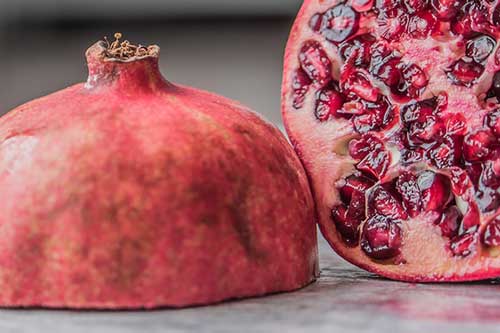
What Are The Health Benefits Of Pomegranates For Cats?
1. Pomegranates May Support Your Cat’s Digestion
A one-cup serving (around 170 grams) of pomegranates boasts as many as 7 grams of fiber. Fiber is famous for its positive effects on digestion.
The compound mainly aids digestion by nourishing the healthy bacteria and other microorganisms lining an animal’s digestive tract, which are technically known as gut microbiome. Studies have shown that a healthy balance of gut microbiome may help reduce the risks of digestive disorders.
Fiber-rich diets like pomegranates may also aid your cat’s digestion by increasing bowel movements. That’s due to the compound’s stool-bulking effects. Frequent bowel movements may help ease various gastrointestinal issues, such as constipation.
2. Pomegranates May Promote Hydration and Weight Loss
About 80% of raw, fresh pomegranates is made up of water.
Cats are notorious for being picky eaters and drinkers. So, watery foods like pomegranates can go a long way in rehydrating cats that don’t drink enough.
Besides, water and fiber are famous for creating sensations of fullness. Giving your cat foods high in both compounds may help reduce the food portions the animal can eat at once, a creative way of preventing unintentional weight gain.
- 12 PACK: Each Delectables Savory Broths Lickable Treat pack includes twelve (12) 1.4-ounce pouches.
- NEW NON-SEAFOOD SAVORY BROTHS: This new texture combines tender real chicken into a rich, savory broth without any seafood...
- CATS LICK THE BOWL CLEAN: The chicken and sauce are entangled in this tasty wet texture, ensuring your kitty eats the whole treat,...
Last update on 2024-07-12 / Affiliate links / Images from Amazon Product Advertising API
3. Pomegranates May Protect Your Cat From Diseases
Pomegranates are a rich source of two powerful antioxidants, namely punicalagins and punicic acid. These compounds can lower the risks of disease by counteracting oxidative stress to body cells triggered by free radicals.
Pomegranates are also high in vitamin C, with a one-cup serving boasting as much as 30% of the vitamin’s recommended daily value (RDV). Vitamin C is another potent antioxidant.
The following are other potential health benefits of pomegranates for cats, based on the specific vitamins and minerals in the fruit;
a. Aiding blood clotting
A one-cup serving of pomegranates contains 35% of the RDV of vitamin K.
Vitamin K plays several crucial functions in the body. However, it’s probably best known for aiding blood clotting.
b. Preventing congenital disabilities
Folate is another important nutrient in pomegranates.
Also known as vitamin B9, folate can enhance DNA and RNA synthesis. That’s precisely why pregnant cats may benefit from pomegranates in small amounts.
Folate is also involved in the synthesis of red and white blood cells.
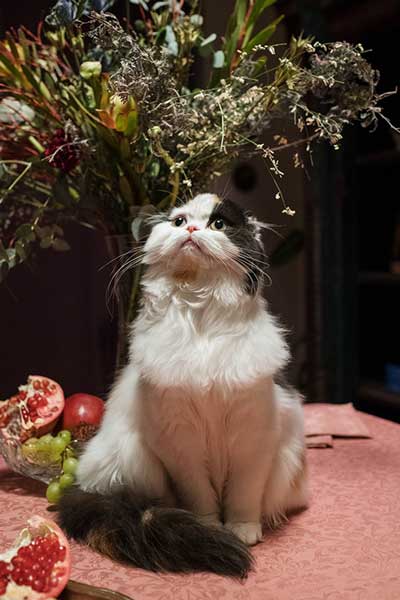
c. Supporting your heart’s heart health
Pomegranates are among the many fruits incredibly high in potassium.
Potassium may reduce the risks of cardiovascular complications like hypertension and irregular heart rate. That makes the mineral, and by extension pomegranates, crucial to your cat’s heart health.
Is Pomegranate Good For Cats To Eat?
Pomegranates are not laced with any chemicals known to be toxic to cats. On the contrary, these fruits contain several vitamins, minerals, and antioxidants that your kitto might benefit from.
So, it’s logical to conclude that pomegranates are safe for cats.
However, remember that pomegranates are only safe and beneficial if served in moderation and as an occasional treat. The fruit can prove disastrous for your cat if overfed.
The following section highlights some of the side effects of pomegranates to cats.
Possible Adverse Effects of Pomegranates for Cats
Gastrointestinal complications are the biggest problem with serving pomegranates to cats.
Remember that cats are obligate carnivores. They can obtain all their nutritional requirements from animal products, particularly lean meat.
In fact, a cat’s body is so wired that it can synthesize some of the essential minerals and vitamins the animal may not readily obtain from his natural diet. An example is vitamin C.
Even the high fiber content in pomegranates might be of no use to your cat after all. That’s because much of a cat’s fiber comes from bones, cartilage, and even the furballs swallowed during grooming sessions.
Since pomegranates are plant-based products, feeding too much of these fruits to your cat might induce several symptoms of gastrointestinal stress. Examples include vomiting, diarrhea, constipation, dehydration, flatulence, and abdominal pain.
- IMMUNE SUPPORT: Human grade for pets. Daily Lysine supplement provides essential amino acids to help support a strong immune...
- EXTRA SERVINGS: 8 oz container = 300 One-Scoop Servings or 150 Two-Scoop Servings. Enough for 5-10 months. Won’t expire.
- ALL NATURAL: Fend off sneezing, runny eyes, and upper respiratory infections with natural immune system support.
Last update on 2024-07-12 / Affiliate links / Images from Amazon Product Advertising API
Perhaps you’ve always wondered, can pomegranate cause cats constipation?
Yes, constipation is one of the numerous gastrointestinal adverse effects of overfeeding pomegranates to cats.
On the other hand, pomegranate-induced diarrhea mainly comes from ingesting too much fiber and water. Although fiber may ease constipation, an excess of it produces a laxative effect and could leave your cat with a runny stomach.
High sugar content is another problem with pomegranates for cats.
A 100-gram serving of pomegranates contains up to 14 grams of sugar. The fruit is especially high in the simple sugars sucrose and fructose. While these sugars may benefit humans, cats need no sugar in their diets.
Sugar may exert undue pressure on your cat’s pancreas. It might also trigger blood pressure issues, ultimately suppressing your cat’s cardiovascular health. Besides, sugar increases the risks of type 2 diabetes.
So, can diabetic cats eat pomegranate?
Sugary foods are the greatest risk factor for type 2 diabetes. The fact that pomegranates are considerably high in sugar makes these fruits unhealthy for diabetic cats.
What of cats with kidney disease, can cats with kidney disease eat pomegranates?
Fresh pomegranates may be low in salt. However, processed pomegranates may contain brine (concentrated salt solution) as a preservative. Brine, or salt in general, is potentially harmful to cats. The compound may trigger sodium ion poisoning, a life-threatening condition that mainly attacks the kidneys. Therefore, cats with kidney disease shouldn’t eat pomegranates laced with brine.
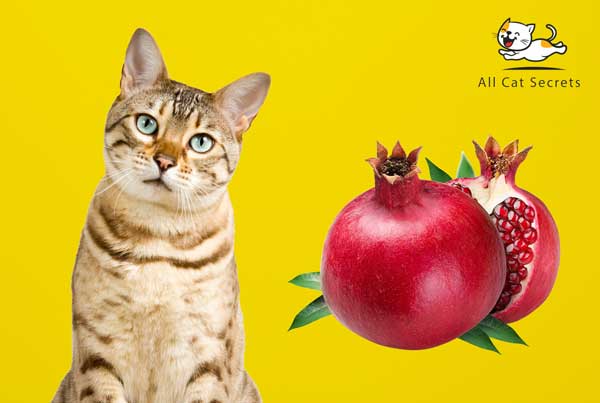
Is It Bad For Cats To Eat Pomegranate?
It’s bad to give pomegranates to your cat if you only consider the potential side effects of these fruits to cats. But as we’ve already pointed out, pomegranates do not contain compounds inherently toxic to cats. That pretty much settles the question, ‘is pomegranate toxic to cats?’
The potential danger of pomegranates for your kitto depends primarily on the serving amounts.
A few pieces of pomegranates offered once in a while shouldn’t be a cause for worry. The problem happens when you try to substitute your cat’s natural diet of lean meat with pomegranates or other plant-based foods.
Does It Matter Which Part Of A Pomegranate Your Cat Eats?
There are several parts of the pomegranate fruit. But as you’re about to find out, not all these parts are deemed safe for cats.
Can cats eat pomegranate skin?
Cats can eat pomegranates skin. But too much of it might trigger indigestion. So, moderation is key.
Are pomegranate seeds poisonous to cats?
As a cat owner who loves to share fruits with his feline friend, you’ll often find yourself wondering, can my cat eat pomegranate seeds?
Pomegranate seeds are non-toxic to cats. However, the seeds could present choking hazards. So, avoid giving your cat pomegranate seeds and insist on the arils instead.
Can I give my cat pomegranate juice?
Pomegranate juice isn’t immediately harmful to cats. But you should probably avoid it. That’s because the juice is even higher in sugar.
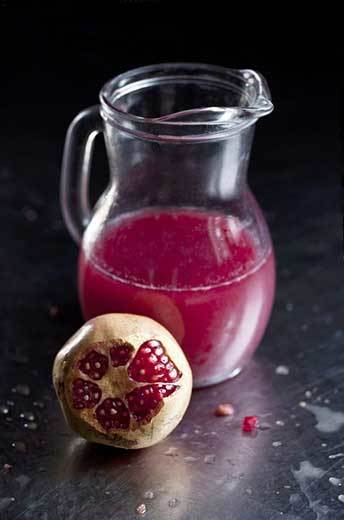
Is pomegranate oil safe for cats?
The safety of pomegranates oil for cats depends on how the oil is administered. Pomegranates oil is generally safe for cats if applied topically but harmful if ingested. Drinking pomegranates oil could trigger diarrhea.
Can cats eat dried pomegranate?
Dried pomegranates lack water. It may also be dangerously high in preservatives like salt. So, cats should avoid dried pomegranates.
Can cats eat pomegranate leaves?
If you occasionally share pomegranates fruits with your cat, you might have also wondered whether the plant’s leaves are safe or dangerous to cats. But are pomegranate leaves poisonous to cats?
Pomegranates leaves may not be toxic to cats. But ingesting these leaves could cause indigestion.
Are pomegranate plants poisonous to cats?
Again, pomegranates are non-toxic to cats. However, the right answer to this question depends on what the word “plants” implies.
Pomegranate branches, twigs, leaves, and seeds could cause indigestion in addition to posing a choking hazard. Your cat will be safer eating small amounts of pomegranates arils.
- Natural prebiotic fiber, sourced from chicory root, helps promote digestive health
- High protein formula with real chicken as the first ingredient
- Fortified with live probiotics to support digestive and immune health
Last update on 2024-07-13 / Affiliate links / Images from Amazon Product Advertising API
Other Frequently Asked Questions About Cats and Pomegranates
Can pregnant cats eat pomegranates?
Pregnant cats can especially benefit from the high folate content in pomegranates. However, pregnancy has a way of taking a toll on an animal’s immunity. So, if you must share pomegranates with your expecting kitto, keep the portions even lower.
Can nursing cats eat pomegranates?
Nursing cats can also consume pomegranates in small amounts due to their rather lower immunity. The same is true for sick cats and older cats.
Can kittens eat pomegranate?
Kittens can eat small amounts of pomegranates. But they’re safer not eating these fruits at all. That’s due to kittens’ sensitive stomachs, which are usually prone to irritation.
Can cats eat a small amount of pomegranate?
Cats should actually eat small amounts of pomegranates.
But the real question is, how much pomegranate can a cat eat in a day?
A few pieces of pomegranate per day divided in to multiple portions should be fine for cats already familiar with these fruits. You can also feed them one spoon of pomegranate juice once in a while by adding it to their food.
Can cats die from eating a pomegranate?
Feline deaths resulting from pomegranates are unheard of. But death could still occur if the side effects of pomegranates in cats go unaddressed.
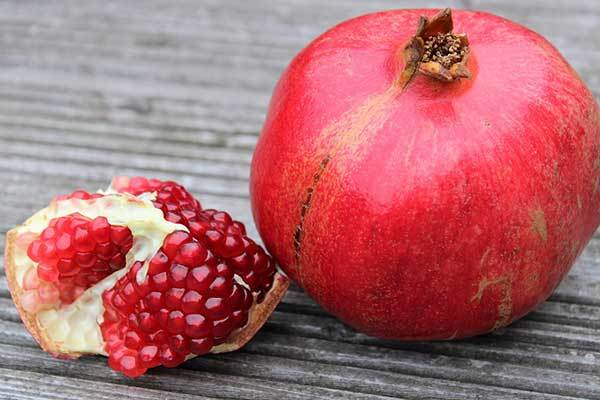
Conclusion: So, Can Cats Eat Pomegranate?
Pomegranates are among the many fruits that cats can eat. These fruits can benefit your cat medically and nutritionally if carefully integrated into his diet. Just remember to practice moderation to prevent your cat from suffering from any side effects.
Checkout Our Favorite Cat Products
1. Best Online Course For Cat Parents
Our favorite: The Cat Language Bible (How to Finally Understand And Speak to Your Cat) – A new form of cat to human communication that many cat owners have dreamed about… but few have actually thought possible.
2. Best Immune Support For Cats
Our favorite: Tomlyn Immune Support – Best Supplement for Cats and Kittens.
3. Best Cat Treats
Our favorites: LIFE ESSENTIALS All Natural Freeze Dried Chicken And Sheba Meaty Tender Sticks – Both are Great.

